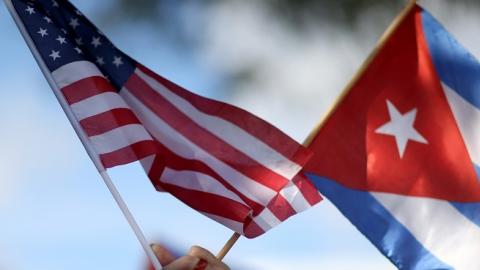Last week’s announcement that the White House intends to restore normal diplomatic relations between the United States and Cuba is part of Barack Obama’s larger project to overturn what he perceives to be wrongheaded, or at least outdated, foreign policies. From Obama’s perspective, the Cold War ended nearly a quarter of a century ago, so let’s catch up to the new reality.
For President Obama, amelioriating this country’s relations with Russia, Iran, and now Cuba amounts to a Grand Reset, a reevaluation of America’s position in a post-Cold War world. However, it’s not clear that either the president or his administration really understands what the Cold War was all about.
According to the White House press release last week: “Decades of U.S. isolation of Cuba have failed to accomplish our objective of empowering Cubans to build an open and democratic country.” That is true, but of course the main obstacle to that empowerment lies not in Washington but in Havana. As many critics of the White House’s about-face on Cuba have noted, the infusion of cash from remittances and tourism alone is tantamount to a bailout of the Castro regime. In other words, normalized relations with a repressive ruling clique are no more likely to empower the Cuban people than the embargo.
However, it is important to remember that the original purpose of the embargo was not simply to empower the Cuban people. Rather, the larger purpose was to protect Americans.
In the wake of World War II, the United States became a global power largely in response to the Soviet Union’s designs in Europe and around the world. The continental United States spread from the Atlantic to the Pacific Ocean, and thanks to the defeat of the Axis and a blue-water Navy, Washington enjoyed hegemony in both, with key trading partners in Western Europe and Asia. The U.S. role was to protect those allies and thereby ensure growth, prosperity, and peace at home.
What threatened those pillars of postwar peace and stability was the Soviet Union, an expansionist power driven by a totalitarian ideology that reduced mankind to its lowest common denominator—want. However, what transformed the Soviet Union into a global threat wasn’t communism, or even the Red Army. Rather, it was Moscow’s nuclear arsenal that compelled the United States to fight or wage proxy battles on four continents for nearly five decades. Cuba was a problem not simply because of the Castro regime and its efforts to spread revolution throughout Latin America, but because it was the satellite of a nuclear-armed superpower, one that decided to base missiles there in 1962. Cuba was the means by which the Soviets brought the threat of a nuclear attack to our doorstep, a mere 90 miles from Florida.
This is the Cold War lesson apparently lost on Obama. If you believe the embargo was a failure, then it means you do not understand its original purpose—to push back against an expansionist totalitarian regime that threatened America at home. The administration’s Middle East policy is further evidence that Obama does not understand how nuclear weapons can turn even the sickliest regime into a destabilizing threat.
The White House believes that bringing Iran in from the cold, and even partnering with Tehran in Iraq and Syria to fight the Islamic State, will help normalize the regime. Then Washington will be able to cold-bloodedly balance Iran against traditional U.S. allies like Israel and Saudi Arabia. Moreover, a “normalized” Iran will allow the White House to continue to draw down in the Middle East, a region that seems to have little love for Americans no matter how much blood we shed or money we spend—and one that from Obama’s perspective has never done him anything but political harm.
The way he sees it, now’s the time to get out of the Middle East. Above all, we no longer have the same Cold War vital interest in Persian Gulf energy that kept us policing the Strait of Hormuz for decades. We might not be energy independent, but America’s energy revolution means that we’re moving toward being much less dependent on foreigners’ energy. Once he restores ties to Tehran, as he’s just done with Havana, Obama no doubt believes he’ll have a free hand to “focus on nation-building here at home,” as he likes to say.
There are many problems with that scenario, but here’s a big one—the unsolved problem of Iran’s nuclear weapons program. It’s not something Obama can eliminate with his famous pen. And as the Cold War shows, a nuclear weapons program in the hands of an expansionist and ideological regime creates challenges far beyond its borders. The United States remains the indispensable power when it comes to dealing with such adversaries. A nuclear Iran will mean America cannot rest at home safely, because our adversaries will bring war even to our threshold. This is the lesson that Cuba teaches—a lesson lost on the man in the White House.
Just last week, the cyber-attack on Sony attributed to North Korea illustrated how difficult it is to deter a terrorist state—one that may or may not have a nuclear weapon. A nuclear capability will similarly make Iran a global threat, one that may come close to our shores as the Soviets did in Cuba—or, following the North Korean example, into our corporate boardrooms. Obama’s right that the Cold War is over. But if he doesn’t see that its lessons are still relevant, his real legacy may be a 21st-century Cold War.
This article originally appeared in the December 29, 2014, Vol. 20, No. 16 of The Weekly Standard.




















